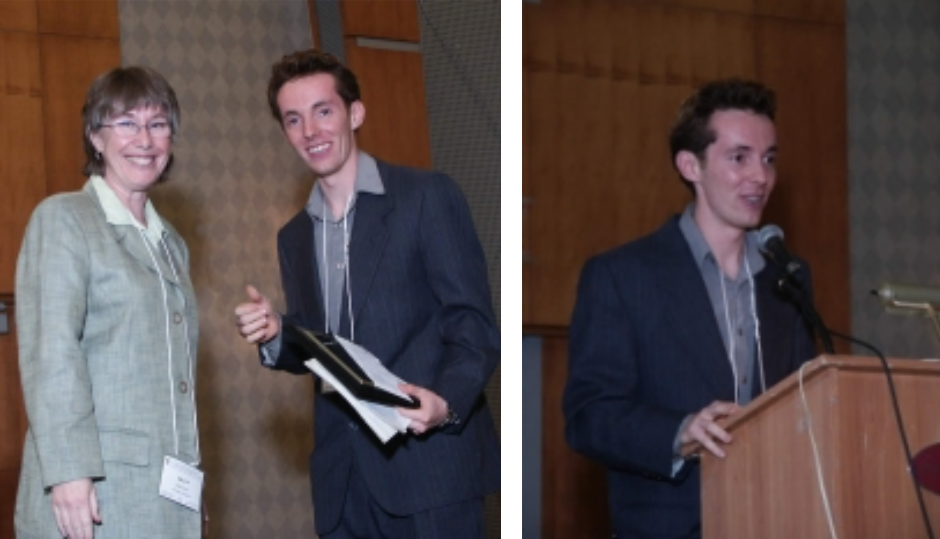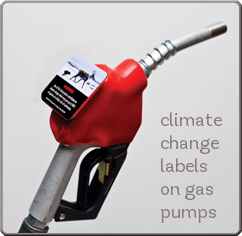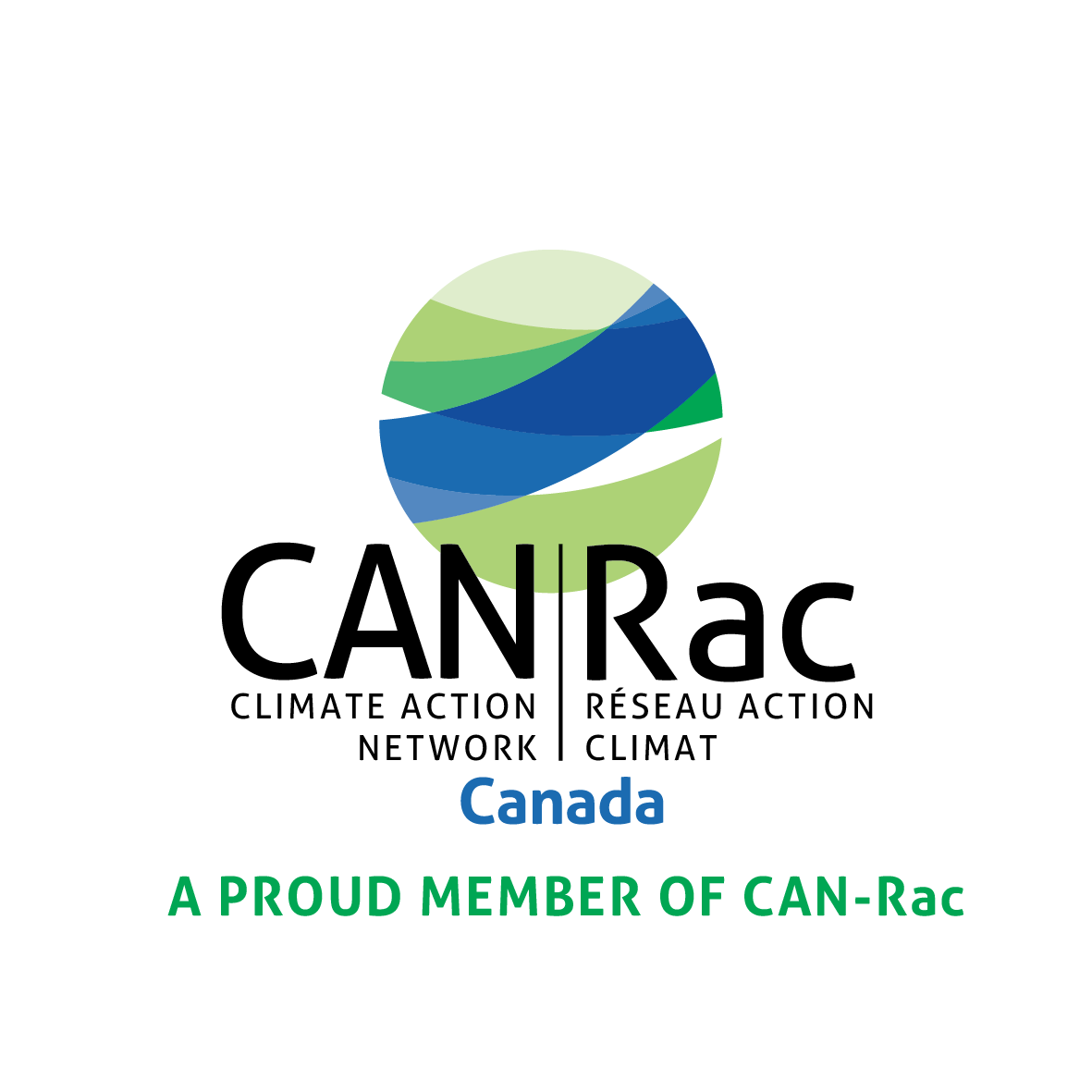Our History
Check out our “Inside the Campaign” interview with our founder to learn how we got started.
[Please note that this page is currently under construction and will be updated over the coming weeks – December 27, 2020]
Rob’s campaign to get climate change warnings on gas pumps can be traced back to work he first began almost two decades ago.
Background.
The images below are taken from the University of Waterloo’s Centre for Accounting Ethics website. The photos were taken from a lecture he gave at the Canadian Academic Accounting Association’s conference in Ottawa in 2003. He had just won the Canada-wide undergraduate Estey essay award for Ethics in Finance and Accounting for his paper, “The Numbers Game: In defence of Social Costing”.

Upon receiving the award, Rob said into the microphone, “Wow! This is my first plaque ever. My parents sure are going to be proud, but I don’t know about my dentist!” Rightfully so, the audience groaned. This pleased Rob immensely.
Among other things, the paper explored the moral difficulties of mechanisms that seek to price social and environmental costs. You can draw a straight line from some of the ideas presented in this paper to the launch of his campaign to get climate change warnings on gas pumps a full decade later.
That summer, Rob graduated with distinction and was his university’s valedictorian. He majored in business and economics and minored in psychology. If you’re familiar with the climate warnings idea and the thinking behind it, you’ll recognize that a lot of the work that went into developing the campaign is rooted in those disciplines.
Rob then went on to work at the Canadian Institute of Chartered Accountants (CICA). His work involved reading the annual reports of dozens of publicly traded companies in multiple sectors to help develop the CICA’s guidance document for the Management Discussion and Analysis (MD&A). The MD&A is the qualitative complement to an annual report’s financial reporting section. It’s a where a company provides analysis for their financial information and, important to this story, discloses various risks to investors.
It was an early introduction to the importance of the disclosure of risk and its role in shaping on investment decisions. For Rob, the analogue was obvious: If disclosures to investors could help shape their decision-making and influence corporate behaviour, surely disclosures to customers could help shape consumer demand and impact corporate decisions, too.
He would have loved to have stayed in Toronto to continue to work with the CICA on some pretty ground-breaking stuff but, instead, he moved to British Columbia to pursue a law degree. Courses like environmental law, international environmental law, and green legal theory all continued to shape his thinking.
After he finished law school, he worked for an environmental NGO in Toronto and, shortly after that, he started to practice law in a municipality’s legal department. The former gave him insight into running a non-profit and the latter gave him first-hand knowledge of the inner-workings of local government. On the latter, he remembers thinking two things: (1) Local government can be an incredibly accessible place for citizens to advance their concerns, and (2) If used in creative ways, Ontario’s Municipal Act can be an amazing tool for enacting environmental change.
Hopefully that offers some background as to how he came to this work. He shares more in his forthcoming book, The Banality of Oil. But how did he get the idea itself? Let’s fast forward to the summer of 2010.
2010. Deepwater Horizon.
The idea first occurred to Rob during the summer of 2010, a couple of months after the Deepwater Horizon explosion in the Gulf of Mexico. This 2-minute video tells the story.
Briefly, he found himself sitting on the main highway that cuts through the north end of Toronto. At that particular point, there are seven lanes that travel east and seven lanes that travel west. It was rush hour so he was essentially caught in fourteen lanes worth of cars that were barely moving.
To pass the time, he turned on the radio and tuned into a station where they happened to be discussing the Deepwater Horizon oil spill. The hosts, guests, and callers were all unanimous in their condemnation of British Petroleum. “Shame on BP! Shame on BP!” went the cries.
But as he sat there, idling in traffic, all he saw was thousands upon thousands of vehicles burning fuel that had to be extracted from somewhere under the earth. And he thought: this is happening on roads all over the world, right this second.
It occurred to him that, while everyone was content to blame BP for the disaster, no one seemed to be asking basic questions like: What was BP doing in the Gulf of Mexico in the first place? Who are they selling their product to? No one seemed to be willing to face the uncomfortable truth that at the other end of an oil drill bit is all of us holding a gas pump.
To be clear, this isn’t victim blaming. Rob isn’t out to shame people. It’s just a recognition that oil companies aren’t extracting this stuff to then simply dump it into a giant swimming pool and light on fire. Exxon isn’t a passion project. They’re extracting it because we use it. If we are genuine about wanting to transition away from fossil fuels, then it’s critical that we look at uses. Unfortunately, among many activists, it’s verboten to question the simple act of pumping gas. For Rob, it became clear that the upstream focus of many activists was contributing to a sense of disconnect and only furthering market complacency. It was clear that we needed something to feel more connected to the impacts of our use of fossil fuels.
Rob’s book will describe this history in more detail but, for now, we’ll leave the story here. In the meantime, if you want to learn more about the thinking behind climate change warning labels on gas pumps, the hour-long lecture below is probably the best resource you’ll find on the web. Take a break from Netflix and give it viewing: you won’t be disappointed.
This section is currently being updated…
Our Horizon is a national not-for-profit climate change organization that empowers people and communities across Canada to change the world.
Our campaign to get climate change labels on gas pumps was launched in early 2013 by Toronto-based lawyer Robert Shirkey. Rob has worried about climate change since he first learned about it in early high school. In the summer of 2012, before his grandfather passed away, his last words to Rob were, “Do what you love.” Those words encouraged Rob to leave his practice to explore an idea for a simple, low-cost climate change intervention he had several years ago.
Since launching the campaign, our work has been featured in media around the world. Over a hundred academics from disciplines including the natural sciences, social sciences, public policy, health, and business at universities across North America have all endorsed our campaign and communities in Canada and the United States are now pursuing the concept. It’s really incredible to think how far we’ve come without any funding or staff. We’re now looking for partners to support our work so we can expand our efforts and make this concept go global.
History in the making… selected milestones:
>> Stay tuned for updates…
>> May 16, 2016: Kitchener’s Council voted to recommend to “the Right Honourable Justin Trudeau and the Honourable Kathleen Wynne, Premier of Ontario… that all vendors of retail petroleum products in Canada be legislated to provide warning labels on all pump handles.”
>> March 1, 2016: Vaughan’s Council voted unanimously to direct staff to research climate change labels for gas pumps and “if jurisdiction can be reasonably argued, that a plan be developed to permit the City of Vaughan to proceed in prioritizing this initiative within its borders.”
>> February 15, 2016: Parksville’s Council voted unanimously to direct staff to consult with Vancouver Island local governments and provide a report to Council about the possibility of mandatory labelling of gas pumps.
>> November 24, 2015: Tofino’s Council voted to “… amend the business licence bylaw requiring retailers of petroleum products in the District of Tofino to provide plastic sleeves (nozzle toppers) with warning or information labels on pump handles for all fossil-based liquid fuels.”
>> November 16, 2015: North Vancouver Council unanimously passed a by-law to implement climate change information labels on gas pumps. It was a global first that was covered by media like CBC, Global News, CTV, VICE, The Atlantic, and more. These stories were shared around the world by social media with many people calling for similar labels in their own jurisdiction.
>> November 3, 2015: Vancouver Council unanimously voted to approve its Greenest City Action Plan, which includes the priority action to “Investigate labeling gas pumps for their GHG and air quality impacts.”
>> October 27, 2015: Port Moody Council voted that “all vendors of retail petroleum products in Port Moody be required to provide warning labels on all pump handles, at the expense of the vendor.”
>> October 26, 2015: Pickering Council passed a resolution in support of climate change labels on gas pumps.
>> October 18, 2015: The Association of Francophone Municipalities of New Brunswick, a group made up of 53 member municipalities, voted in support of climate change labels on gas pumps. Please check back here soon for more details on the wording of the resolution – thanks!
>> September 25, 2015: Mayors and Councillors from across British Columbia voted at the Union of British Columbia Municipalities “that UBCM support, and that member local governments will implement where possible, legislation to require retailers of petroleum products to provide plastic sleeves (nozzle toppers) with warning labels on pump handles for all fossil based liquid fuels.”
>> September 14, 2015: Waterloo’s Council unanimously votes to support the FCM resolution “that all vendors of retail petroleum products in Canada be legislated to provide warning labels on all pump handles.”
>> July 20, 2015: Oakville’s Council unanimously votes to back the FCM/AMO resolution for climate labels on gas pumps across Canada/Ontario. They also went a step further by voting to directly request the “Prime Minister of Canada, the Premier of Ontario, and local MPs and MPPs” to implement the labels across Canada/Ontario.
>> June 15, 2015: Council in the City of North Vancouver, BC unanimously votes to “to bring forward a bylaw to include that warning labels be placed on all gas pumps within the City of North Vancouver, cautioning consumers about the effects of climate change.”
>> May 25, 2015: Council in the City of Guelph, Ontario votes to support West Vancouver’s Federation of Canadian Municipalities resolution for climate change labels on all gas pumps across Canada. Also votes to advance the proposal via the Association of Municipalities of Ontario.
>> April 20, 2015: Council in the City of Moncton, New Brunswick unanimously votes for climate change labels on gas pumps. Watch 14-year-old Hayley Touchburn’s compelling 5-minute speech to her Council on Youtube.
>> April 11, 2015: The Association of Vancouver Island and Coastal Communities, a regional body made up of 51 member municipalities voted to “support, and will implement where possible, legislation to require retailers of petroleum products to provide plastic sleeves (nozzle talkers) with warning labels on pump handles for all fossil based liquid fuels.”
>> March 1 & April 1, 2015: Municipal World, the most influential publication in Canada’s municipal sector, publishes Rob Shirkey’s articles on our project. The magazine is read by councillors and staff across the country. [Download March article and April article].
>> February 23, 2015: District of Saanich Council votes to support West Vancouver’s resolution to require climate change labels on gas pumps across Canada. Several British Columbia municipalities pass similar resolutions in the following weeks.
>> January 26, 2015: West Vancouver Council unanimously passes a resolution “that all vendors of retail petroleum products in Canada be legislated to provide warning labels on all pump handles (pump talkers).”












